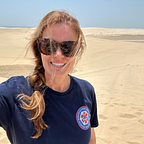The Orange Light in the Sky: Collaborative Medevacs and Active Volcanos in The Aleutian Islands
“What is that orange light in the sky?” I asked the crew from the back of a United States Coast Guard (USCG) helicopter. I am not enlisted in the CG so how did I come to be riding in the back of one with a critical patient?
To answer that we must go back a little farther.
“What do you do for a living?” I get asked by literally everyone I meet. That is just what we ask each other right? Maybe it tells us something about each other maybe it doesn’t. I like variety in my work — but I like consistency in my relationships.
“What do you do for a living?” is not the easiest question for me to answer. Whatever needs doing. Wherever I am needed. I try to preserve life and health. I do my best and I don’t always succeed the way I want to. I am a physician assistant in a mostly self-guided study PA to MD bridge program working part time in The Aleutian Islands in Dutch Harbor/Unalaska at the Iliuliuk Family Health Services Clinic. I am the “heavy call” person — the ER person. Sometimes I still work at Mayo Clinic Florida too - in The Department of Orthopedic Surgery. I also go to California and other remote places — but I am far less nomadic since the Coronavirus Pandemic hit…I chose my fox hole and I am manning it. I am here in The Aleutians for now.
“That sounds like it could be exciting”
It is pretty exciting. Think riding in the back of a United States Coast Guard Helicopter past an actively erupting volcano overlooking The Bering Sea King Crab fishing fleet level of exciting. Think taking off on a short runway in the back of a United States Coast Guard C130 with an intubated patient on two pressors for a three-hour medevac level of exciting. That guy walked out of the hospital five weeks later. I love my job. I am someone who likes (possibly needs) variety and adrenaline in my work.
When we cannot find any way to medevac a patient and they are likely going to die if we don’t — we call the United States Coast Guard. They have helped us save countless lives out here. They are incredible partners. The gratitude I have for the Coast Guard is immeasurable. They are the ultimate eject button — the help button. They are heroes.
I couldn’t help but notice the orange glow out the window of the USCG helicopter. My intubated patient was stable. The monitor was between my feet and the medication pump was in my lap. I took one last look at everything to be certain all was well and stole a glance out the window.
“What is that orange light?” I asked the crew.
“Probably the moon” the pilots were busy flying a helicopter over The Bering Sea through the mountainous Aleutian Island Chain — they didn’t really have time to debate funny lights in the sky with me. I accepted the answer.
The flight engineer focused the night vision camera on the strange light and nudged me:
It was an actively erupting volcano: Mount Shishaldin. Serene in its green white and black image on the monitor. Satisfied with the answer — I returned to focusing on the monitor and medication pump.
We landed in Cold Bay (a longer runway and alternate Space Shuttle landing site) and met up with the crew from a commercial medevac company: LifeMed. We transported the patient together to Anchorage.
As happens when I volunteer for these collaborative multidisciplinary medevacs — I am now stranded in Anchorage. The LifeMed crew had to return to Dutch Harbor the next day so they were kind enough to let me stowaway as an observer on the return flight. LifeMed is also an outstanding partner in medevacing patients in The Aleutian Islands and they understand the gravity of getting a provider back to their remote post.
It was on this return flight where the Pilot — Daniel — who is an awesome human being — was able to snap a quick daytime photo of the Shishaldin Volcano erupting:
Based on the distance — we estimated that the lava plume might be going 800–900 feet into the air. Molten lava was streaming down the mountainside. Smoke was billowing thankfully away from our flight path. This was stark — a much more violent appearing event than the serene night vision image.
“That sounds like it must be exciting”
So yes, it is very exciting to work out here in The Aleutian Islands. More importantly is that it is very rewarding. We don’t always get the great saves — but sometimes we do — it is everything to see someone smiling and walking down the street who would have otherwise died. We will do anything we can do to keep you safe — including jumping into the back of a CG helicopter and braving the winds of The Aleutian Islands and Bering Sea if that is what it takes to save your life.
Special thanks to:
The Unites States Coast Guard
The Unalaska Fire and Rescue Department. UFD!
And LifeMed.
The lives LifeMed has saved in The Aleutian Islands numbers in the thousands. It is an honor to serve these people with all of you.
